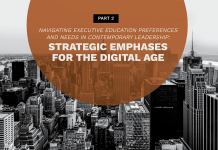Slowly but surely, business schools are now starting to integrate generative artificial intelligence into their curriculum.
Many business schools are in a unique position to bear a considerable obligation to prepare students for success in the constantly changing and fast-paced business world. It’s crucial for these institutions to persistently adjust to the most recent trends and changes in the business sphere, ensuring that their curricula stay relevant and aligned with these fluctuations. By addressing these elements, business schools can ensure that their graduates are equipped with the essential knowledge, competencies, and mentality to thrive in the dynamic realm of business.
The swift progress of artificial intelligence has triggered a transformative influence on the business landscape, necessitating business education to adapt and confront the arising challenges and prospects. By incorporating diverse viewpoints and cross-disciplinary methods, these institutions can cultivate a more comprehensive and all-encompassing comprehension of the intricacies and subtleties of the contemporary business environment.
Let’s explore the role of generative AI in modern businesses and how it’s being incorporated into business curriculum development.
Revolutionizing Business Operations with AI Integration
The fusion of artificial intelligence (AI) within executive education programs has become a cornerstone, transforming conventional business methodologies. AI-driven automation optimises processes, curtails expenses, and enhances operational efficiency. Unlike traditional systems, AI-driven solutions operate ceaselessly, ensuring consistent outputs and freeing human resources for intricate, creative endeavours. INSEAD’s Transforming Your Business with AI programme will equip you with practical frameworks to work with data scientists and programmers, showing you how to commission analysis, analyse the results you receive, to accelerate productivity and competitive edge for your organisation.
Evolution of Workflow Automation
While the roots of automation date back centuries, the recent advancements in AI have revolutionised modern workflow automation. Robotic Process Automation (RPA), for instance, mirrors human actions across multiple software systems. Unlike conventional automation confined to singular applications, RPA seamlessly navigates numerous systems, performing tasks and even communicating with other digital interfaces. Leveraging algorithms and machine learning, RPA adeptly handles complex processes, streamlining multifaceted tasks and decision-making. IESE Business School’s Artificial Intelligence for Executives programme provides participants with a broader understanding of the power of artificial intelligence for businesses, including its impact on business models, sources of competitive advantage and organizational structure.
Elevating Customer Service through Automation
Automated customer service, notably chatbots, efficiently tackles diverse customer queries via natural language processing. They adeptly handle FAQs, process orders, and troubleshoot basic issues, enabling human service agents to focus on intricate problems requiring a personal touch. London Business School’s The Business of AI gives you a solid understanding of the advantages and limitations of AI and machine learning (ML) in business settings to communicate effectively with stakeholders, and by extension, your customers.
Empowering Supply Chain Management
The digitalisation of manufacturing, marking the onset of the Fourth Industrial Revolution, plays a pivotal role in crafting adaptive and robust supply chains. Automation within supply chain management involves tracking goods via sensors and software, automating inventory updates, optimising logistics, and mitigating overstocking or understocking risks. SP Jain School of Management’s Digital Supply Chain Management will help you understand what digital supply chain management is and why it is important, identify new opportunities created by digitisation, develop a digital supply chain management strategy and learn how to leverage the right technologies for your organisation.
Strategic Decision-Making with Machine Learning
Machine learning, a subset of AI, employs algorithms to learn and make data-informed decisions. These adaptable models transcend traditional rule-based systems, providing precise solutions across diverse business domains. From predicting customer behavior in CRM to optimising stock levels in inventory management, machine learning’s applications span various business sectors. MIT Sloan School of Management’s Artificial Intelligence: Implications for Business Strategy challenges common misconceptions surrounding AI and will equip and encourage you to embrace AI as part of a transformative toolkit designed for business specifically.
Harnessing Data for Informed Strategies
Data-driven decision-making, facilitated by machine learning tools, extracts actionable insights from vast and intricate datasets. Machine learning models amplify data science’s capabilities, unveiling nuanced relationships between variables, and empowering businesses with informed strategies, such as real-time analytics for agile responses to market fluctuations. Oxford’s Artificial Intelligence Programme is designed for managers, business leaders, and technical professionals across multiple functions and industries looking to understand the workings, possibilities, and ethics of AI technology.
Conclusion
By keeping up with new trends and advances and emphasising practical, hands-on learning, business schools can play a crucial role in shaping the future of business and propelling the accomplishments of their alumni. The “new age” of executive education will possess the acumen to envision innovative applications of AI as the technology advances and its capabilities expand.
About the Author
Pamela Martinez is a writer for The European Business Review. She is dedicated to crafting timely blog pieces about business acumen, changing leadership dynamics, emerging finance and technology trends, global breakthroughs and how these spaces intersect from a millennial’s perspective. She also works as an editor and content strategist and the sister publications of The European Business Review.




























